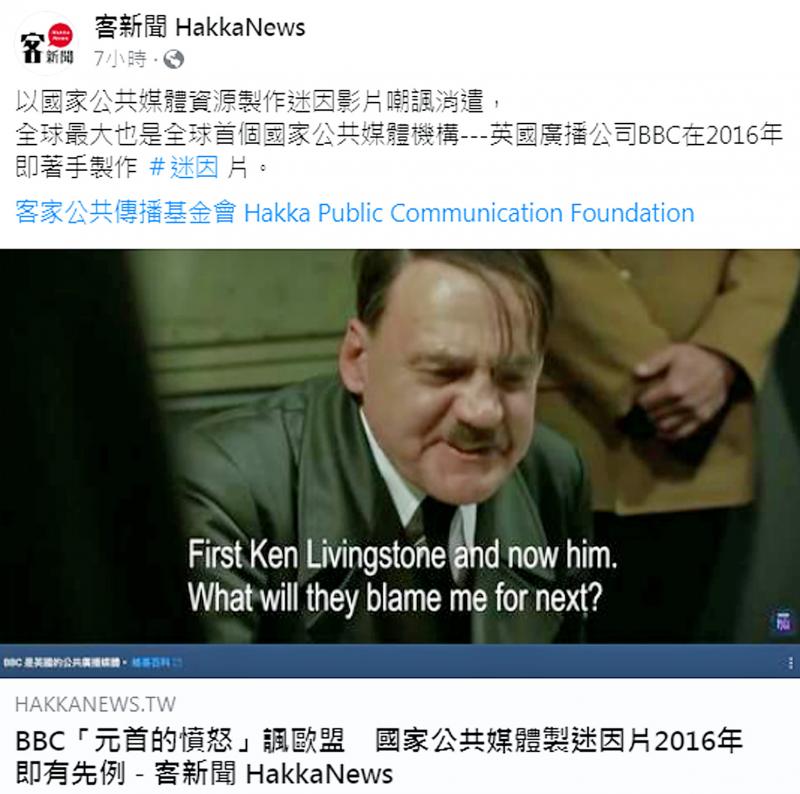The Hakka Public Communication Foundation yesterday defended its use of a meme video created from a film about the final days of Adolf Hitler to promote Hakka cuisine, saying that it was not meant to advocate Nazism or belittle Hakka people and their culture.
The foundation issued the statement after Taiwan People’s Party Legislator Lai Hsiang-ling (賴香伶) on Tuesday night criticized the meme, writing on Facebook that the foundation should not mistake the “banality of evil” for something funny.
“We have received complaints about a short film on Hakka ciba [糍粑, sticky rice cakes] produced by the foundation in which footage of a Nazi film featuring Hitler was used to promote Hakka cuisine. Did nobody find it inappropriate?” Lai wrote.

Photo: Chen Chih-chu, Taipei Times
Lai criticized the foundation’s social media managers for disregarding a tragic period in history for the sake of boosting viewership of Hakka News, a social media Web site.
“They completely missed the mark by using a sensitive topic to promote Hakka culture. This is way out of line, considering that Hakka News was created by the government-funded Hakka Public Communication Foundation,” she said, adding that Hakka Council Affairs Minister Yiong Con-ziin (楊長鎮) and foundation chairman Chen Ban (陳板) should explain themselves.
The clip, titled The Fuhrer’s Wrath, was taken from the 2004 German-language film Downfall, the foundation said.

Photo: Screengrab from HakkaNews Facebook
Netizens around the world have recreated the clip into hundreds of meme videos, with subtitles in different languages, it added.
These meme videos were created to mock current news events or entertain people, it said.
“Before we decided to turn the clip into a meme video with subtitles in Hakka, we had discussed whether it would give people the impression that we were promoting Nazism or disparaging the Hakka people,” the foundation said. “However, YouTube did not flag the content of our meme video as hate speech or derogatory remarks targeting an ethnic group. Viewers did not see the meme video as promoting Nazism either.”
On the contrary, most of the Hakka News viewers found the meme video interesting, regardless of whether they are Hakka or speak the language.
“The original video clip has been widely circulated online for many years, and any recreation of it should not cause any confusion,” the foundation said.
While the foundation would like to thank people for their concern for the Hakka community and humbly accepts any criticism, “it is regrettable that the Hakka people do not have the same right as other communities to use the same clip and create a meme video.”
Lai’s comments about the video drew mixed reactions.
Some said that the foundation’s social media managers “were nuts” for coming up with such a video, while others said Lai misunderstood Jewish political philosopher Hannah Arendt when she wrote about the “banality of evil,” or that she does not understand young people.
“The movie clip has been turned into many meme videos over the years, and we young people think that the meme video was fun and there was nothing inappropriate about it,” a person named Ken Wei posted on Lai’s Facebook page. “You [Lai] should calm down and ask young people before making any judgements.”

The Chinese military has built landing bridge ships designed to expand its amphibious options for a potential assault on Taiwan, but their combat effectiveness is limited due to their high vulnerability, a defense expert said in an analysis published on Monday. Shen Ming-shih (沈明室), a research fellow at the Institute for National Defense and Security Research, said that the deployment of such vessels as part of the Chinese People’s Liberation Army (PLA) Navy’s East Sea Fleet signals a strong focus on Taiwan. However, the ships are highly vulnerable to precision strikes, which means they could be destroyed before they achieve their intended

The Taiwan Experience Education Program (TEEP) has funded short-term internships in Taiwan for more than 4,500 young people from more than 40 countries since 2015, with the goal of attracting and retaining international talent, the Ministry of Education said yesterday. Fifty-five colleges launched 514 projects this year, including in fields such as semiconductors, artificial intelligence, medicine and biotechnology, green energy, and sustainability, it said. The program provides research and practical internships in Taiwan for two to six months, and offers cultural exchange and networking opportunities, the ministry said. For example, National Formosa University’s Embedded System and Autopilot Laboratory developed two solar-powered drones in

GLOBAL: Although Matsu has limited capacity for large numbers of domestic tourists, it would be a great high-end destination for international travelers, an official said Lienchiang County’s (Matsu) unique landscape and Cold War history give it great potential to be marketed as a destination for international travelers, Tourism Administration Director General Chen Yu-hsiu (陳玉秀) said at the weekend. Tourism officials traveled to the outlying island for the Matsu Biennial, an art festival that started on Friday to celebrate Matsu’s culture, history and landscape. Travelers to Matsu, which lies about 190km northwest of Taipei, must fly or take the state-run New Taima passenger ship. However, flights are often canceled during fog season from April to June. Chen spoke about her vision to promote Matsu as a tourist attraction in

Taipei resident Mu Chu-hua caught some glimpses of China’s mighty military parade on YouTube on Wednesday. As she watched hypersonic missiles roll down Beijing’s Changan Avenue and troops march in lockstep, she did not feel like they posed a threat to Taiwan. Mu, a 69-year-old retiree, said she saw the parade as simply a way for Chinese President Xi Jinping (習近平) to “say thank you to the troops.” “I thought it was quite normal,” she said. “It was very cool.” China’s military parade commemorating the end of World War II was being watched internationally for insights into Beijing’s military advances and its show